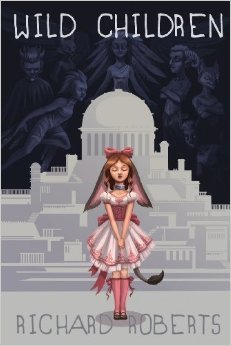Taven Moore's Blog, page 12
March 25, 2015
[Perry] Lessons Learned From Flinx and Pip Part 1
So recently, I got a hold of an old science fiction series written by Alan Dean Foster that I read bits and pieces of when I was much younger.
When I first ran into the characters of Flinx and Pip, I was…not quite as sophisticated and mature a reader as I am now. I loved these characters and the world unabashedly.
But the libraries around me only had the books in scattered bits and bobs, I’d only managed read a book here, a book there. Still, what I’d read, I’d really enjoyed and I thought that one day, it would be nice if I could go through it all, in order, from start to finish, just to really know what the overarching story was about.
Well, I had that opportunity just a little while ago, and suffice to say, it’s an experience I should have left in my past.
Still, there were valuable lessons learned on what NOT to do when writing. Lessons that I will share with you now so that you don’t have to go through my pain.
There’s a lot to cover, hence, the multi part blog post.
It’ll be meandering. It may not make much sense at times. There will probably be a lot of question marks and ranting.
We will be tackling these problems in order of less severe to most severe, for a sense of natural progression.
…Let’s get started!
Basic Premise
The series is a science fiction tale spanning fourteen books. The main character, Flinx, starts the series as a young orphan who gets adopted by a cantankerous old woman in a market planet called Drallar.
Flinx adopts a pet, Pip, a mini-drag from Alaspin (think flying snake) who can shoot caustic venom and also is an empath (it senses emotions). Which is convenient because Flinx is also an empath. He’s the product of an illegal genetics experiment and he’s one of the very few products still alive in the groups efforts to ‘improve’ humanity.
Join Flinx on his adventures gallivanting around the planet, then the galaxy, discovering that there’s a looming, immensely huge, galaxy devouring threat heading their way, and he’s the only one who can stop it!
The Problem of Writing vs Publication
This is actually only an issue with one book in the long series, but it comes at a rather pivotal point in the story and feels all the more egregious because of it.
So book three of the series, Bloodhype, is actually set as book ELEVEN or so in the story.
The reason for this mixup (from what I’ve gathered), is that after the success of the first two books of the Flinx and Pip adventures, Foster had already written another book.
This other book was set in the same universe, but didn’t feature the title characters of the series, Flinx and his pet Pip.
He was told to FIT Flinx and Pip in there, somehow, and market it as a Flinx and Pip book.
So you have this book, ostensibly, book 3 in the series, where Flinx isn’t the main character. Where he’s only sort of in there very briefly to the sides before fucking off to…you know, stop the galaxy devouring threat.
Here’s the problem.
It’s one of plot consistency.
See, minor changes to the plot? Not that big a deal, to be honest. I mean yeah, there will be some things that don’t match up, given how late in the Flinx timeline this book was ACTUALLY supposed to happen when it appeared? It makes sense that not everything is going to line up.
My issue with it?
Flinx fucks some random woman.
I use this instance of profanity in a very deliberate manner.
The woman he bones is the co-main character of the novel, a female church spy named Kitten Kai-Sung (yes, it’s terrible. Absolutely terrible and stereotypical that there would be a female sex kitten type femme fatale character ACTUALLY NAMED Kitten, but it was published back in the ’70’s so maybe we can cut him some slack).
Flinx and Kitten end up fucking.
Again, very deliberate word usage.
Near the middle/end of the book, the main characters ask Flinx if there’s anything they can do to reward him for his unexpected help. He nods to her and says that he wants her.
Literally. That’s what he says.
Then they go off-screen to fuck, and Kitten comes back out, complaining of aches in various places ahem, and Flinx takes a nap.
You know, barring how…phenomenally, BLATANTLY out of place, random and inappropriate that was? Here’s my issue with it.
As the series progresses (so books 4-10), Flinx is portrayed as a generally soft-spoken, rather sensitive young man who’s terrible with women. He helps people that need help…just because. He advocates helping other species that can’t help themselves, and puts himself at great risk to do it, over and over again.
Then you have to try and reconcile that man with the man he was in book 3 (book 11 in the story), where he randomly appears at the right place and time to save the day and basically demands sex from a woman he’d just met as payment.
But that? That isn’t even the worst part.
Oh yeah, it gets worse.
See, Flinx is in love. In book nine, he reunites with the lovely Clarity Held. A beautiful, scientist woman he’d met a long time ago. Over the course of the book, they reaffirm their deepening connection to one another and she resolves to go with him on his journey to stop the galaxy devouring evil, to the ends of the universe if she has to…
…Except she gets injured in a terrorist explosion right at the end of the book and Flinx leaves her behind with his friends, telling them to guard over her recovery as he starts the search alone to take the heat off her.
Book ten, he has a brief solo adventure on a planet, worrying about Clarity the whole time, wondering if she’s recovering well. Wondering if she still wants to be with him.
…Then book eleven where he bones Kitten.
Then book twelve, thirteen, and fourteen where he beats himself up over why he would have sex with some random woman when he’s so in love with Clarity.
…Really? I’m not even kidding, that shit HAPPENED.
Potential solutions to this problem
Anything. Almost literally, anything would have been better.
You could pretend that book never happened? Put a foreword or an afterword in a book and explain that that book isn’t canon, continue on.
Book 3 (11 in the timeline), doesn’t contribute much, if anything, to the big bad problem Flinx is dealing with in the latter half of the series. It wouldn’t effect much to simply excise it.
Or? Alternatively? You can write him into a situation where that’s something he would do at the time and recover him after.
There’s really no excuse. He had seven books worth of time to figure out a way to make that situation plausible.
It would have been easy to slowly spiral him down into despair after Clarity is injured, put him in a life-threatening situation and make it like…depressed, I’m going to die anyway sort of situation.
He could have kept Flinx and Clarity from deciding to be together till AFTER that point (easily done as the subsequent books had a decent amount of fluffy, filler type material).
He could have done many things.
Instead?
Random sex and we, the reader, get to deal with the main character suddenly going completely inconsistent in the Nth hour of the overall story and trying to come to grips with why he would do such a thing.
Great fun.
Stay tuned next week where we talk about inconsistent pacing and how you too can avoid stalling out your narratives by having your main characters get stranded alone in a hostile environment, book after book!
March 24, 2015
Post Slowdown
I’ve been trying to get at least one post a week out here, and I think it’s been stressing me out on the weeks when I feel like I don’t have much to say.
So, experiment time! I’m going to post whenever I DO feel like I have something worthwhile to say (whether that be about sushi or gaming or writing, who knows?!) but I expect there’ll be a very distinct slowdown in the posts I write.
Perry may keep going like a pro, you know how he is. =]
As a reminder, you can sign up for the weekly newsletter direct to your email if you want to know when I do stuff without having to manually check (feed readers are also a valid option, but I know not everyone uses those).
lovemuffins I hope everyone’s doing well!
March 18, 2015
[Perry] Importance of Lighting in Description
There’s a lot of cross-….pollination? That can be done between the art of filming/photography and the art of writing.
I’m more than reasonably sure that’s not the right word to use, but it’s the word I’m using for now, so there.
But regardless, I think there’s a lot that the study or the examination of these other disciplines can do to benefit your writing, or at least, your ‘writing eye.’
Here’s a specific example.
Recently, I stumbled upon this short, 5 second video.
What it is, is a brief look at a woman’s face as the lighting changes to come from various different directions and various different intensities.
I was struck by how different her face and her expression looked. The same woman and the same face, looking totally different because the light was bright and shining from below, or shining from above with her head tilted down slightly.
You can even pause this short video at any point and see a completely different face on her, just due to the light.
And I began to wonder how often I’d overlooked that descriptor, simply because it hadn’t really occurred to me.
I mean, yeah, I’ve used the device where someone walks slowly into a room and the shadows slide away from their face, revealing them for who they are, right?
But have I really delved into all the different things that shadows can do to someone’s features? Have I really taken a look at the impact light can have on someone’s expression? The way it can soften the hard edges of their face? Or how it can accentuate the sharp lines and tense look?
No, I can’t say I have.
And if I had to single out any reason as to why that is? It would be because it simply hadn’t ever occurred to me to really do so. To really explore just HOW much the different direction of light can change the way someone looks.
Until now, that is. After having seen that short clip, I can’t help but wonder what else I’m missing, simply because I wasn’t aware it exists.
Here’s another example: Movement.
In this article from Kotaku, they detail a brief test given to people applying to become animators for Toei, a fairly prominent Japanese animation studio.
In it, they’re asked to depict several key frames of a boy using a heavy sledge hammer to hit something.
The simplest answer, as you’ve probably guessed, isn’t quite the correct one, and the video embedded in the article goes through the thought process of what they’re really being asked to consider, which is the basics of human movement.
It’s something I don’t tend to think too deeply on. And I’m not saying we should all go out and include EVERY single detail we can think of.
No, I can’t help but think that would only lead to a cluttered, description heavy work that wouldn’t be appealing to read at all.
But thinking a little more deeply about these things? I can’t help but feel that it would allow us to add the occasional small detail. Nothing overt or overwhelming, but here and there, to help lend authenticity to our descriptions.
March 16, 2015
Sushi-Q
SOOOOOOOSHI
I love sushi. I’m not gonna lie.
But I’m a terrible sushi consumer because I add a ton of tamari (gluten-free soy sauce) and wasabi and that’s no way to enjoy QUALITY sushi.
I don’t care. That burn is so so so good. And the flavors? Muah! Magnifique!
But even with the relatively inexpensive cost of the sushi rolls at my favorite place (conveniently located near my work, Sushi Muramoto — I recommend it if you’re visiting Madison) … I need to set some funding boundaries.
But I love sushi. But money. But sushi!
deep sigh It’s a true conundrum, friends.
So I solved it by making my own “sushi”!
Why Call it Sushi-Q?
Honestly? Because true sushi-afficionados would be insulted that I would call it sushi. I don’t use raw fish in any of my rolls (I’m not confident in my skills or my supply).
Also? I’m going to be making rolls that most definitely aren’t sushi-related. They’ll just LOOK like sushi.
For example, I made a glorious roll out of ground pork chops and herbed cheese and roasted red peppers. You don’t get that roll in this post because the seaweed wrap didn’t quite work with it, but experimentation is a go!
So yes. All my stuff, I’m calling Sushi-Q, even if it’s pretty-darn-close to what a bargain sushi joint would give you.
Ingredients
For this particular roll, I used the following:
Rice. You can make REAL sushi rice if you’d like, but we have a giant costco bag of a longer-grain rice. It works just fine for my needs, no special prep involved at all.
Smoked Salmon (fully cooked. Wild-caught if you can get it)
Fresh slices of avocado (mmmm, yomyom)
Wasabi sauce (it’s pathetic compared to the good stuff or even the real stuff, but it’s available in my local grocery store.)
Seaweed wrap.
That wrap SHOULD be relatively easy to find in a big enough grocery store. I picked this one up from World Market, but others tell me they’ve seen these flat green sheets elsewhere.
Tools
Bamboo sushi rolling mat
I got this from World Market, too. You could absolutely use almost anything with similar properties (it’s not a magical mat or anything) but this does its job PERFECTLY. Protip, if you cover it with cling wrap, it still works AND is easier to clean.
Wooden spoon
The paddle I’m using is very much a sushi paddle thing, but it probably doesn’t matter. The shape of this makes it easy to spread the rice around.
Container of cold water
Rice is STICKY. Dipping your spoon in this helps you move it around on the seaweed without it all getting stuck on the spoon. Also useful for quick hand-wetting if you need to use your hands for some of it.

The Process
1) Make sure you’ve got all your stuff cut up and ready to go. Put a sheet of seaweed on the mat, rough-side up.

2) Spread the rice out on the seaweed. Try to get a relatively thin, even layer, and leave a small section closest to you clean. This is the bit that will “seal” the roll when the seaweed touches itself. Plus, as you roll, the contents will push down to fill some of this space.
3) Add your fillings! One column towards the top (about an inch or so from the very top) is all you need. DO NOT OVERFILL. I learned this lesson for you. (you’re welcome). This picture may seem like not a lot of filling, but I assure you, it’s plenty.

4) Roll it up! Use the mat to get a firm grip on the roll and keep it tight as you go.


5) Slice your beautiful roll into even pieces using a sharp knife. You may want to dip your knife into your water container a few times to keep it from getting too sticky from the rice.

6) The two very-end pieces will probably be jagged and unpretty. You might just need to eat those first so nobody sees them. (oh, darn)

7) Om to the Nom Nom. I made two rolls for these pics, so one of them went in mah bellah and the other got arranged in our normal leftover containers. The round shape of my container is a little unforgiving, but I arranged them as pretty as I could.


You’ll notice below that I had another previously-made roll on hand for a photo shoot. This one was made with shrimp and roasted red peppers and spicy mustard. It was made into a lunch with a rice ball, some roasted root vegetables, two extra shrimps on top, and a sweet egg roll (tamagoyaki. Mmmmm so good)

March 11, 2015
[Perry] Review of “Revival” by Stephen King
Note: I will do my best to avoid spoilers in the post, but the comments section may contain spoilers to this novel, that novel, and seventeen movies you were planning to get around to someday.
So this morning on my drive to work (Tuesday), I came to the end of an audiobook by Stephen King called Revival.
It’s his most recently published novel, and if you’ve followed along with King’s works recently, you’ll know that he sort of goes through troughs. He’ll put out some good books, then a lemon or two, then back to good books, before inevitably bombing another book or two.
This? I think is perfectly reasonable for a man who publishes as prolifically as he does.
But all that aside, let’s talk about this book.
Premise
We’re introduced to Jamie Morton when he’s six years old. He meets pastor Danny Jacobs (who is then a young man).
The young pastor suffers a tragedy where he loses his faith in God, and so he goes away.
Jamie and Jacobs separate for a time to live their separate lives, only to meet later in life to strange consequences.
Thoughts on Timespan
I don’t really want to say too much, part of the draw to the book was definitely a lot of the reveals, so we’ll leave that to the wayside for now.
Let’s talk about how it feels.
King…I mean, I know there are people that aren’t that into his works? But honestly speaking, it’s amazing to watch the man work.
Despite his occasional misses, this here’s a man who’s been writing and publishing for almost half a century now and. It. SHOWS.
He may not be the most critically acclaimed writer in the world, and nobody would ever argue that his works will go down through the ages as classics, to be studied centuries hence, but he knows how to write for his audience.
The biggest thing that hit me with this novel was the sense of time he manages to impart.
We follow along with Jamie Morton as he narrates his life story from the time he’s six, up until he’s sixty or so.
You can feel the passage of all that time. By the time you get to the end, you really get the sense that the man’s lived his entire life before your eyes, int he brief span of pages from cover to cover.
The novel certainly doesn’t cover his life in any great and exacting detail, but you dip in and out of specifics enough to really get the sense of a man who’s lived a full life, and I found that something marvelous to witness.
In truth? This may be aided by the fact that I listened to the audiobook over the course of a couple weeks, so maybe in my case, the sense that time has passed had been magnified by the real passage of time instead of my normal one or two days of blitz reading…but I don’t think that’s the case.
I feel like I’ve lived this man’s entire life with him, and that’s truly something to behold.
Thoughts on Characters
Another thing that King does well? Characterization. His characters, major and minor alike, feel like real people. They feel like they have their own wants and dreams and ambitions. They talk in ways that make them sound distinct and they perform small actions and employ little mannerisms that make it sound more like they’re being described than being invented, if you get what I’m saying.
Jamie Morton and the choices he makes? The promises he makes and breaks, the ones he keeps, the way he lives his life? He feels like a real person.
And Pastor Jacobs, I think, is easily one of King’s strongest characters in a while. He feels real and vital, with a real person’s obsessions and follies.
It’s a wonder to watch these characters peel themselves off the pages and walk about their daily lives. To tell you the truth, it makes me more than a little jealous, and fires up the urge in me to write, just to see if I can eventually make people as real as these ones.
You get roped along by their quests and desires and sorrows, almost to the point that you lose track of the thread of the story tying everything together.
If you’ve ever experienced it before? You’ll know what I mean by it. And if you haven’t, you really owe it to yourself to take a look at this novel and see if you can’t see it too.
Criticisms
In all honesty, I only really had one gripe about the novel, and that was the ‘twist’ at the end.
The novel isn’t a deus ex machina story, not by a long shot, but I really thought the final screaming left turn into madness could have been introduced a little more gently.
The ending doesn’t come completely out of nowhere. There’s a somewhat vague quotation that’s tossed about liberally throughout the novel that gives a decent clue as to what’s coming.
My issue was mainly with the connection between the two. It felt abrupt. Having a decent idea of what was coming versus being able to see how those two things link together is an entirely different thing, though.
I thought there could have been a little more of a soft linkage between the body of the work and the events of the final two chapters…but that honestly might just be me and my preferences.
I know there are some Stephen King fans among you and I would love to hear what you made of the ending.
Thrilling Conclusion!
All in all, if you’re a fan of Stephen King, whether current or lapsed, I do recommend giving this latest outing a read.
I found it quite…uh, electric.
flees from the fruit being thrown on-stage
March 9, 2015
10% Time At Work
As a web programmer, I work with the most fickle and ever-changing environments possible. Devices, languages, standards, aesthetics, best-practices, and browsers don’t sit still just because I’m not in school anymore.
But when I go home, I want to relax. Work out. Read a good book. Blog about how badly I want to write a good book.
You know. Stuff.
So while there are those dedicated programmers out there who scour industry news in their off-time, I (and other programmers like me) are likely to rest happily with the knowledge we have. We do our job and don’t really take the time to look into things like Node.js without some external impetus to do so.
10% Time
Well, now that our massive web project is underway, my work is re-instating 10% time.
What is 10% time, you may ask?
10% of the time I am on the clock at work, I should be learning.
Every Thursday afternoon, I am not only encouraged but required to stop working on whatever projects are currently on my plate and pick up some other technology-related project and tinker with it.
It doesn’t even have to be work-applicable. My job considers it important that we learn and hone our skills even if there’s no direct line that can be drawn between our learning and our job.
That is MIND-BLOWING to me.
They’re literally paying me to learn whatever I want as long as it’s tech-related.
Projects
I’m finally reading some of the design books I’ve been drooling over. I’m investigating gamification — what works and what doesn’t, ways that it can be incorporated into applications and even general life.
One of my coworkers is investigating building a fitbit for her dog. Another is playing around with iBeacons. A third is building a little device that will measure the salt levels in their water softener and send a text message when it needs to be refilled.
Learning
When I was in college? I was paying SO much for every class that I couldn’t afford to take extras. And when I swapped from Computer Science to Business Information Systems, I had to count Engineering Calculus II and Discrete Math and other such courses as electives because I’d already taken them and they didn’t apply to the BIS degree.
I didn’t have a lot of room for free-form exploration and learning.
10% time at work makes me feel … almost light-headed with the possibilities. I can learn anything I want. They’ll even pay for hardware if it’s not too expensive, like a rasperrypi or something along those lines.
Business
And I know this sounds frivolous and possibly insane on the part of my employer, but historically at this business? 10% time projects turn into some of the most wonderful and impressive aspects of our services.
While everyone knows that’s true, there’s still zero pressure to try and work on a project that will be business-applicable.
I hope more companies instate things like this, I really do.
March 5, 2015
The Great British Bake Off
My mom recently introduced me to this show. I don’t have cable tv, so we watch it on Youtube, where the episodes are smallified and sometimes the audio is sped up a little, but it’s worth it. It is so incredibly worth it. I really wish it was available on Netflix.
Like many cooking competition shows, it starts with a goodly number of people and week by week whittles them down until a winner is declared.
Unlike all of the other cooking competition shows I’ve watched, this is a sheer delight. These are all amateur bakers who love what they’re doing. But more than that is that even though they want to win, they never intentionally sabotage or even look sour when others are doing well. Instead, if you watch the faces of the other bakers, they cheer with the good comments and offer comfort when things go wrong. They’ll even help each other during their own downtime because they want everyone to be able to do their best.
When someone leaves, there are hugs and commisseration and it’s just so wonderful.
Plus all the accents are amazing, of course. =]
We started watching Season 5 and I think that’s as good a place to start as any.
March 4, 2015
[Perry] Wild Children
Let’s talk about this book.

Tami suggested that I take a gander at it a little bit ago. She was kind enough to lend it to me and because she’s built up a fair bit of Media Recommendation Credit with the bank of Perry, I took a look at it with no question.
I immediately saw why she wanted me to read it.
Premise
The story follows…a bit of a patchwork format. There are four different POV characters or so, and largely speaking? They all deal with their own little story. But the characters are pretty interconnected and show up in each other’s story.
It’s one of those formats.
The story takes place in a world where children occasionally turn into “wild children”. They take on characteristics of various animals, to varying degrees.
The reasons why this transformation happens is one of the big questions of the book (that it doesn’t end up answering). The meat of the story comes from the interaction of the rest of the normal human population to these wild children. Reactions range from pity, to hatred, to envy, to lust…
Suffice to say, it’s a disturbing fucking book.
What I Liked About It
Let’s talk about the writing.
Roberts does this…wonderful, dreamy, almost disconnected style of writing throughout the novel.
Tami coined a phrase for it that I thought was lovely.
“Crayon-logic”.
The world is seen through the eyes of children, ages seeming to range from about 8-15 or so. You see the world and the things that are happening through these bright, pastel colors…even when the events being described are NOT suitable topics for children to be involved in.
Do you know what kind of feeling I got reading portions of this book?
It’s like…it’s like hearing a little boy, with that little kid lisp, talking about how the bad man touched his pee-pee.
It’s like seeing a children’s pop-up book, talking about how the scary monster’s going to come to your house when you’re bad and rip your mother’s head off (with a cute little pop-up head popping off with blood thing).
Do you get what I’m saying? It’s like seeing or hearing about these absolutely horrific things, that even adults have a hard time dealing with…but seen through the lens of a child’s worldview.
That’s the sort of feeling that large chunks of this book gave me.
They deal with the idea that wild children, after their transformation are property. Bought and sold to people, usually as ornaments? But there are STRONG undercurrents that the wild children are being used as sex slaves too, and that…that shit is unsettling as all hell, especially because it’s seen through the child’s worldview.
I’m not telling you this is a bad thing. I thought it was a marvelously effective way to present the information in a way that hits hard.
A consequence of this type of writing style is that it feels very dreamy, almost disjointed. But there’s a thread of meaning you can almost, almost see floating beneath the words.
In some ways, it’s a lot like the writing of Catherynne M. Valente, she who wrote The Orphan’s Tales with such success.
There’s a segment of this book? That follows a cat child named Jinx? Easily my favorite part of the novel, hands down. Probably because you can sort of see how the world ticks, and there’s that lovely image of him stealing the rich and exquisite pain of other wild children and selling them to a pain broker to ‘burn off’ his own sins.
Fascinating stuff.
What I Didn’t Like About It
I’ll start with the nitpicky stuff and move onto the heavier hitting topics.
I didn’t like…that the world-building felt really fuzzy.
When the book starts, it could have been taking place in an alternate version of our own history, maybe around the era of horse drawn carriages and obsessions with alchemy? Heavy influence by the church throughout the land, etc.
Yes, there are the wild children, but that would be the ‘alternate version’ bit.
But…the next chapter puts a lie to that, with the introduction of Jinx, and the shadowy, half-world that he travels.
So maybe it’s a completely separate world at a similar stage of growth/technological learning?
No, but they reference the Bible. And Jesus, and the books of the apostles.
Do you see where I’m going with this? You might disagree, but I found that, ‘maybe-maybe not’ kind of world building quite disconcerting. It just didn’t work for me. I kept wanting the book to make up its mind and either PUSH to be an entirely different world, or pull back on the weirdness just enough that it could still be ours.
You could have easily had the religious aspect without directly referencing our real world religions and still had the same effect.
But nope, it felt a bit of a muddle to me.
I also didn’t like how none of the questions are actually answered.
The question of why wild children are formed? The criteria of how the animal form is chosen? The ‘rules’ of the world are never explained, never clear, and constantly, constantly broken.
I felt like I was on a sandbar that was slowly being eroded under my feet.
I couldn’t really get a solid ground on what was possible, what wasn’t possible, because it just kept changing from one moment to the next.
A lot of impossible things happen in Valente’s Orphan’s Tales novels. And a lot of impossible things happen in a story like Alice in Wonderland.
The difference is that in those works? It all feels like…the impossible things happening are consistent with the world it’s being built in.
I don’t get that feeling here. Shit happens and I right up until I turned the last page? I had no idea whether I felt like this or that was/is/SHOULD HAVE BEEN possible or impossible.
Finally, the last big thing that bothered me?
The primary theme of the book seemed to be the topic of sin and religious zealotry masquerading as social reform.
This is a personal taste, so not really something I thought the book did weakly, just something I don’t have a stomach for.
But I can’t stand that shit.
I have enough problems with religion that’s quiet and unassuming and doesn’t hurt anyone, let alone trying to come to grips with a religious zealotry that sweeps a country and has them hunting down children.
Children, I might add, who largely turn into wild children BEYOND THEIR CONTROL. Again, this ties back into the wiffle-waffling of the world building.
If it was a matter of…if you’re a horrible, hateful child? And that turns you into a wild child? I can kind of get that. I wouldn’t agree with it? But I would have an easier time swallowing it.
But the book wiggles around on the idea of why wild children happen. So you have grown ass men and women, all ‘fired up’ with the will of God, hunting down these children because they’re different or because they’re seen as objects of sin and lust?
Ick.
Just, do NOT agree with that. Makes me uncomfortable as all hell to read it.
Final Words
It’s not a bad book to read.
As you’ve seen, my biggest issues with it are easily more matters of personal taste and discomfort than anything particularly wrong with the writing, do you know what I mean?
So if you feel like a novel that’s kind of on the darker side of strange and dreamy? You could do a lot worse than to give Richard Roberts’s Wild Children a chance.
March 3, 2015
Images and Font Fixed!
Finally found time to fix the post image sizes and ridiculously huge font size on larger screens. Please let me know if you’re still experiencing a problem (I almost certainly missed some styles) and I’ll do my best to fix them as soon as possible.
Thank you all for your patience!
March 2, 2015
On Starting Fresh With a New World
Let’s say you’re struck with a fantastic new concept. What if (for example) the battle for the souls of humanity is even more pitched than we know? What if angels and demons appear at the time of death for souls “on the fence” and hold a small official court hearing to determine the destination for that soul?
And what if Hell is winning because all the really good lawyers go to Hell (lol, lawyer jokes never get old — they’re almost as villified as Nazis) and so the main character is a less-than-pristine soul that got in to Heaven on a technicality and now has to train a bunch of lily-white angels in courtroom politics.
Bam. New world. Inklings of an actual plot in there, so just start typing away, am I right?
NO, THAT IS NOT CORRECT.
Ahem.
Look. Even assuming that plot up there wasn’t almost directly yanked from a book I recently read (and it was, up till the laywer joke), what I’ve got up there isn’t a book. It’s not a story idea.
At BEST, it’s a concept. It’s a tiny candle flame of something interesting which MIGHT turn into a story that MIGHT turn into a book.
It’s always so tempting when a new concept appears and sways provocatively in front of us, but we have to think back to our previous flames.
Yeah. Those. The half-finished, limping manuscripts we’ve shoved into a metaphorical chest in the dustiest corner of our attic.
You need MORE than just a concept.
You need characters (that lawyer up there is a good start, and it’s easy to branch out and add some angels and demons and a human or two for good measure).
You need PLOT — not just “how cool would it be if this was true” but move past that. If this is true, then HERE is a problem that my main character can solve which is directly intertwined with that neat concept.
Yes, if your “cool concept” is Emergency Soul Court, your plot should utilize that cool concept as much as possible. Which means an interesting court case. How is the case interesting? How does the main character’s unique perspective allow them to solve the problem AND make them the most fun person for us to follow around on this journey?
This is not, in my opinion, a case of Pantser versus Plotter. Plotters take this and run even further, building outlines and history and the like.
We’re not talking about that.
Pantsers (and every writer I know was a pantser at one time or another) — how often do you start writing about a cool concept and then a couple chapters in a plot starts forming? And you have to constantly explain to your readers that it starts to get really good around chapter 5 or so?
Pretty freaking often, if you’re anything like me-as-a-pantser.
And EVERY bit of prevailing writing advice says to ditch the “intro” chapters and get right to the plot.
If you can have at least an inkling about your plot ahead of time, you can make things up as you go along and spin a great, surprising tale in true pantser style.
If you don’t, then more often than not stories run out of steam because that initial concept is just a candle, not a flamethrower. It can’t sustain the weight of characters and plot without help.
And if you’re lucky, while you’re in the initial throes of that creative energy, thinking up new characters and plot options gives you even MORE candle flames. That crusty lawyer meets a sweet little cherub who eats nothing but sugar and breaks out into a rash when he tries to tell a lie. One of the demons is OCD and can’t stand it when brimstone gets on her jacket. One of the humans is a disabled veteran who bombed an innocent village and runs an animal shelter and a soup kitchen in his retirement. The interesting court case involves purgatory (how does purgatory work in this world?)
… the more things you know, the more questions you can ask yourself and the more bright spots you can use to hang your story on. If you only ever start with a single vibrant idea, then your story will only have that one hook to keep YOU (the writer) interested in what’s happening.
Next time Inspiration slaps you upside the head with a shiny new idea, stop and really look at it before you dive into your wordcount. I’m not saying you have to throttle all the surprise out of it, but just a few moments spent thinking about the world AROUND that idea can often net you very valuable rewards. You AND your readers.
(P.S. If you’re not sure if you’ve got a “plot” yet, ask yourself “what is the problem that the main character needs to solve?” If you don’t know the answer, or have a hard time pinpointing it in a mishmash of character development, take a step back and try again.)
Taven Moore's Blog
- Taven Moore's profile
- 5 followers



